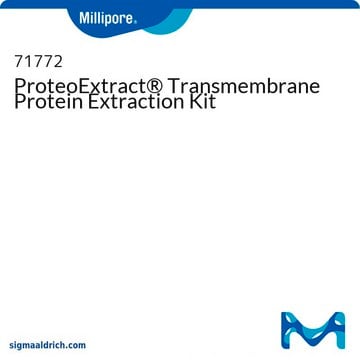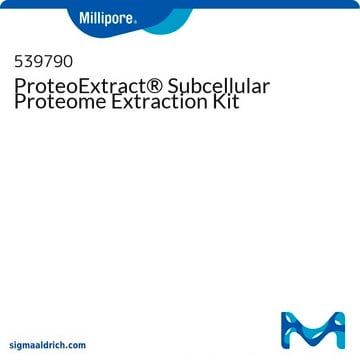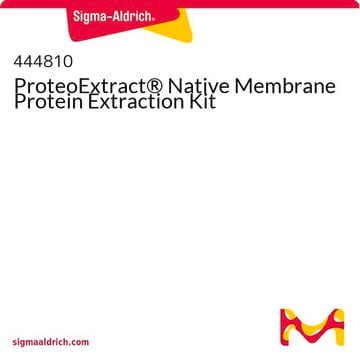539180
ProteoExtract® Protein Precipitation Kit
Autenticatiper visualizzare i prezzi riservati alla tua organizzazione & contrattuali
About This Item
Codice UNSPSC:
41106500
NACRES:
NA.32
Prodotti consigliati
impiego
sufficient for 200 precipitation(s)
Produttore/marchio commerciale
Calbiochem®
Condizioni di stoccaggio
OK to freeze
Condizioni di spedizione
ambient
Temperatura di conservazione
10-30°C
Descrizione generale
A convenient and highly reproducible kit for the precipitation and clean-up of proteins. Yield of precipitated proteins is higher than that of traditional methods with improved solubility of the precipitated protein. Contains sufficient components to precipitate 200 samples of ≤200 µl. Requires 150 ml of ethanol (not provided). Kit delivers protein solutions of very low conductivity.
Componenti
Precipitant 1, Precipitant 2, Precipitant 3, Precipitant 4, Wash Solution, and a user protocol.
Attenzione
Toxicity: Multiple Toxicity Values, refer to MSDS (O)
Principio
The ProteoExtract Protein Precipitation Kit is designed for the concentration and clean-up of proteins from aqueous samples.
Nota sulla preparazione
• Samples: The assay will precipitate proteins from a broad range of sample types containing from 50 µg/ml to 10 mg/ml protein. The assay will tolerate chaotropes (e.g., UREA) to to a concentration of 8 M, detergents up to 4%, and salts up to 2 M.
Note: Prior to using the kit for the first time, the Precipitation Agent and the Wash Solution must be prepared and chilled to -20°C.• Precipitation Agent: 1. To one bottle Precipitant 1 add 1.7 ml Precipitant 2, 1.7 ml Precipitant 3, and 1.7 ml Precipitant 4; mix well.2. The mixture of Precipitant 1, 2, 3, and 4 is called the Precipitation Agent. One bottle Precipitation Agent (34.1ml) is sufficient for precipitation of 40 samples of 200 µl each. 3. Label the Precipitant 1 bottle after reconstitution for easy recognition.• For ease of use, store the Precipitation Agent at -20°C; reconstituted Precipitation Agent is stable for up to 2 months.• Wash Solution:1. Add 150 ml high quality ethanol (not provided) to the bottle of Wash Solution (denatured ethanol may also be used).2. Mix well and store at -20°C. Reconstituted Wash Solutions is stable for up to 1 year.Note: Each 200 µl sample requires 800 µl Precipitation Agent and 1 ml Wash Solution.
Stoccaggio e stabilità
Upon arrival, all components of the kit can be stored at room temperature (20°C). For ease of use, the prepared Precipitation Agent and the Wash Solution can be stored at -20°C (see Reagent Preparation).
Altre note
Due to the nature of the Hazardous Materials in this shipment, additional shipping charges may be applied to your order. Certain sizes may be exempt from the additional hazardous materials shipping charges. Please contact your local sales office for more information regarding these charges.
Note legali
CALBIOCHEM is a registered trademark of Merck KGaA, Darmstadt, Germany
PROTEOEXTRACT is a registered trademark of Merck KGaA, Darmstadt, Germany
Codice della classe di stoccaggio
10 - Combustible liquids
Certificati d'analisi (COA)
Cerca il Certificati d'analisi (COA) digitando il numero di lotto/batch corrispondente. I numeri di lotto o di batch sono stampati sull'etichetta dei prodotti dopo la parola ‘Lotto’ o ‘Batch’.
Possiedi già questo prodotto?
I documenti relativi ai prodotti acquistati recentemente sono disponibili nell’Archivio dei documenti.
Yong Zeng et al.
Protein & cell, 8(2), 123-133 (2016-11-24)
Human monocyte is an important cell type which is involved in various complex human diseases. To better understand the biology of human monocytes and facilitate further studies, we developed the first comprehensive proteome knowledge base specifically for human monocytes by
Ceri A Fielding et al.
PLoS pathogens, 10(5), e1004058-e1004058 (2014-05-03)
NKG2D plays a major role in controlling immune responses through the regulation of natural killer (NK) cells, αβ and γδ T-cell function. This activating receptor recognizes eight distinct ligands (the MHC Class I polypeptide-related sequences (MIC) A andB, and UL16-binding
Amy Bradshaw et al.
Frontiers in surgery, 3, 48-48 (2016-09-13)
To identify and characterize cancer stem cells (CSC) in glioblastoma multiforme (GBM). Four-micrometer thick formalin-fixed paraffin-embedded GBM samples from six patients underwent 3,3-diaminobenzidine (DAB) and immunofluorescent (IF) immunohistochemical (IHC) staining for the embryonic stem cell (ESC) markers NANOG, OCT4, SALL4
Konrad Pazdrak et al.
Journal of immunology (Baltimore, Md. : 1950), 186(11), 6485-6496 (2011-04-29)
The priming of eosinophils by cytokines leading to augmented response to chemoattractants and degranulating stimuli is a characteristic feature of eosinophils in the course of allergic inflammation and asthma. Actin reorganization and integrin activation are implicated in eosinophil priming by
Kirin Tan et al.
Plastic and reconstructive surgery. Global open, 6(2), e1686-e1686 (2018-04-05)
The pathogenesis of Dupuytren's disease (DD) remains unclear. An embryonic stem cell (ESC)-like population in the endothelium of the microvessels around tissues that expresses components of the renin-angiotensin system (RAS) has been reported. This study investigated if this primitive population
Il team dei nostri ricercatori vanta grande esperienza in tutte le aree della ricerca quali Life Science, scienza dei materiali, sintesi chimica, cromatografia, discipline analitiche, ecc..
Contatta l'Assistenza Tecnica.







